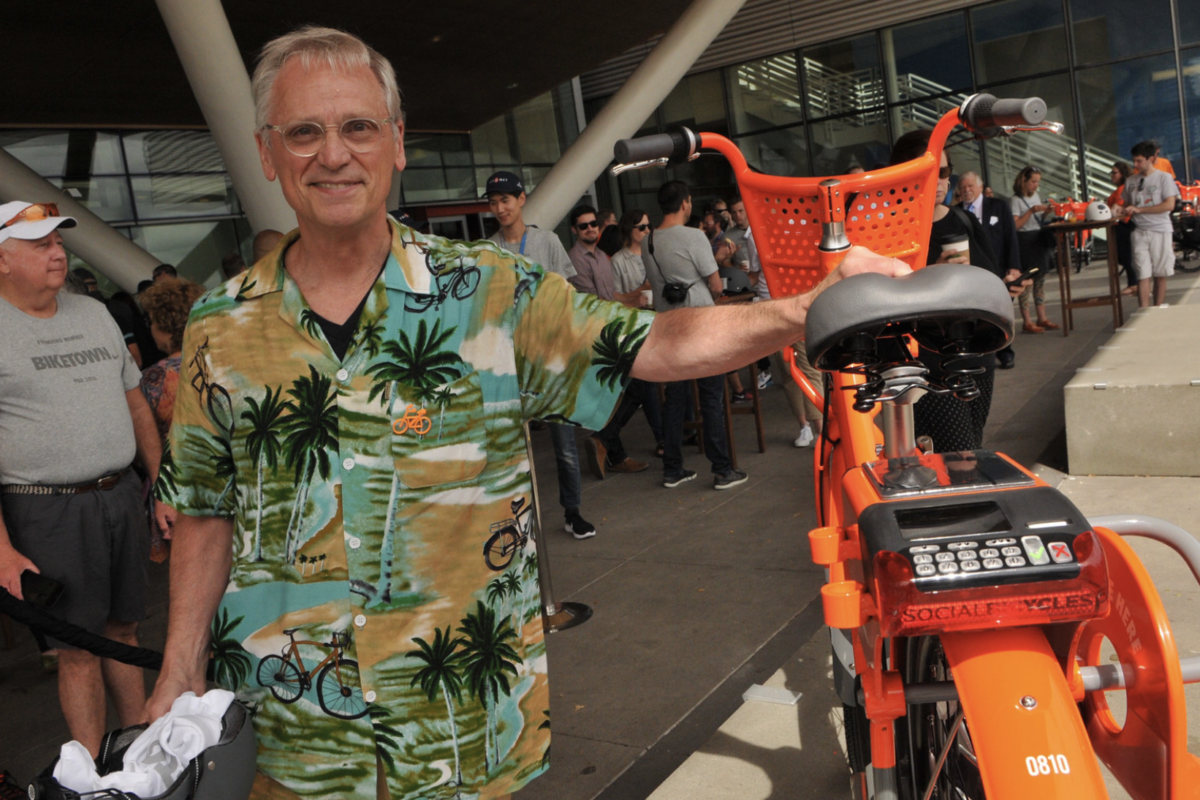
“I don’t want to sound like ‘Johnny-one-note’ with our cycling agenda, but burning calories instead of fossil fuel is something that will make a difference right now.”
-Earl Blumenauer
Thanks to inflation and the war in Ukraine, gas prices have hit record highs, and in the car-dependent United States, a lot of people across the political spectrum are unhappy.
But instead of using this as a wake-up call to shift toward low-car transportation and loosen the Americans’ grip on their steering wheels, many local and national officials have proposed band-aid policies to make gas cheaper. Recently, President Joe Biden announced a proposal to temporarily lift the federal gas tax – about 18 cents per gallon for regular gasoline – to lighten the financial burden for Americans who drive petrol-powered cars.
But this idea has not been very well-received. Critics say it’s a political gimmick at best. At worst, it’s outright climate arson to continue encouraging people to drive gas vehicles.
One of these detractors has been Earl Blumenauer, the U.S. Representative from Oregon who represents most of Portland east of the Willamette River. In a June 16th letter to Biden, Blumenauer urged the President to seek alternate solutions.
“While there is undoubtedly a need to provide American consumers relief from spiking costs, there is no guarantee a gas tax suspension would reduce prices at the pump or stem the broader inflation affecting the global economy, and it may only increase oil companies’ bottom lines,” Blumenauer wrote. “Suspending the federal gas tax would not lower prices for consumers, and would not have the desired political effect; it also would seriously damage important policy opportunities, and should be rejected by your administration.”
I spoke with the Congressman on the phone Monday morning and asked him to elaborate on what he thinks about the future of transportation policy given the political temperature in D.C. and the bipartisan fixation on ‘pain at the pump.’ One thing Blumenauer (who is the co-chair of the informal U.S. Congressional Bike Caucus, by the way) thinks would help? Bikes.
“One of the things we routinely emphasize is there are things we can do that would cost a fraction of this and would actually help people,” Blumenauer told me. “I don’t want to sound like ‘Johnny-one-note’ with our cycling agenda, but burning calories instead of fossil fuel is something that will make a difference right now.”
For the last year and a half, Blumenauer has been trying to use infrastructure talks to propel bike legislation, specifically with a bill to make electric bikes more affordable as a way to reduce car dependency.
“Electric bikes can transform even nominal cyclists into bike commuters. It really makes a difference.”
“Electric bikes can transform even nominal cyclists into bike commuters,” Blumenauer says. (We concur.) “It really makes a difference.”
One particularly troublesome element of the gas rebate discussion is how it ignores the fact that many lower-income Americans don’t drive cars. They need better active and public transportation infrastructure, not prepaid gas credit cards. Blumenauer agrees these people have been left out.
“Low income people and people of color are heavily transit-dependent. But [gas tax holiday proposals indicate] we shouldn’t be as concerned with them as we are with the suburban single-occupant vehicle commuter. It’s not rational, and it’s not fair,” he says. “It’s been really frustrating they don’t get the they don’t get the same attention.”
At this point, it seems unlikely Biden will be able to shore up support for a federal gas tax holiday. But several state governments, including in states with liberal governors, are going for it. And just the fact that it’s on Biden’s radar at all is cause for concern.
Even with these disappointing trends, however, Blumenauer appears hopeful for progress in the future. While bold transportation infrastructure investment may seem like a lost cause should Democrats lose control of Congress in the fall, Blumenauer says he still trusts Biden’s administration and Transportation Secretary Pete Buttigieg to make moves.
“Working with federal, state and local agencies, we can have a profound influence, regardless of the outcome of the midterm elections,” he says.
Blumenauer points out the transportation provisions in the $1.2 trillion infrastructure bill passed last year, acknowledging it’s only a “modest breakthrough” (advocates say it may actually increase carbon emissions) but that some of its funding will help fund active transportation projects across the country. He also says he is seeing a cultural paradigm shift against freeway expansions, including in very car-centric communities like Phoenix and Los Angeles. (Check out the Freeway Fighters Network map to see other places – including Portland – where this battle is playing out.)
Blumenauer says he sees Portland projects like the 82nd Avenue jurisdictional transfer, the plan to expand the Streetcar to the Northwest Industrial District and the upcoming bike and pedestrian bridge with his namesake as indicative of progress here that could be replicated elsewhere. And he says he and the ‘bike constituency’ (which includes other active transportation activists) aren’t going anywhere.
“Communities all over the country are struggling with the same challenges. A more diverse set of low-carbon transportation alternatives – with less reliance on single-occupant vehicles and more on bikes, pedestrian and transit – is key to success,” Blumenauer says. “We’re in it for the long haul.”



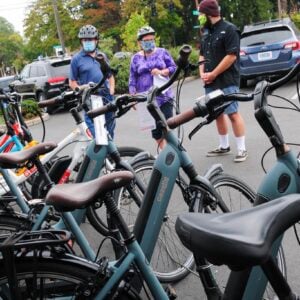
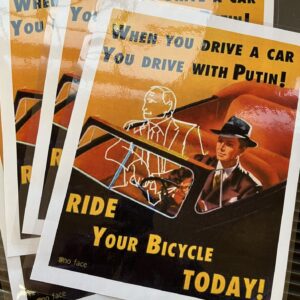
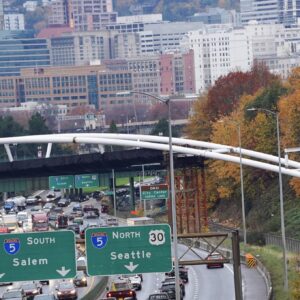
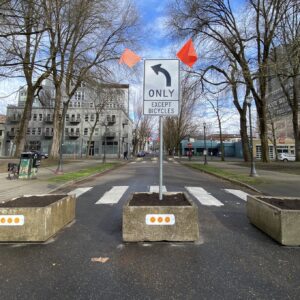
Thanks for reading.
BikePortland has served this community with independent community journalism since 2005. We rely on subscriptions from readers like you to survive. Your financial support is vital in keeping this valuable resource alive and well.
Please subscribe today to strengthen and expand our work.
This article is a perfect illustration of just how out of touch Blumenauer, and more generally, the progressive echo chamber has become, and why they will get a serious dose of reality in the mid-term elections.
High energy prices aren’t caused by inflation and Russia’s attack on Ukraine. Rather, inflation and Russia’s self aggrandizing are caused by the flawed policies of Blumenauer, and the greens of the West, that demonize fossil fuels, shower money on expensive and unreliable solar and wind, cede energy leadership to dictators, subsidize impractical electric cars, bikes and public transit, etc., yet make no appreciable contribution to global energy and transportation needs.
Energy prices are the basis of all costs, so the public, especially those with low incomes, need not just lower gas and transportation costs, but lower costs overall, and this will only happen when the supply of affordable and reliable energy increases. The self inflicted recession likely to occur in the coming months will temporarily soften demand, but ultimately the world needs energy for humans to flourish, and it’s incumbent on policy makers like Blumenauer to get real when it comes to balancing the elite concern for GHG reductions with the energy needs of everyone else.
For me, as a someone who’s advocated for cycling, embraced liberal causes all my life, and always voted for Blumenauer, the patronizing attitude of “just rely more on bike and bus, that’s what is best for you” is just an embarrassment. I suspect for those shouldering the heaviest burden of Blumenauer’s inflationary policies, it’s an insult.
If Blumenauer, congress, and the Biden administration want to do something that actually helped people and cost nothing, they could cause an immediate reduction in energy prices, and thus inflationary pressures, by tempering the green rhetoric, throttling back the green policies, and making a full throated commitment to the US being the world’s leading producer of oil, gas, and nuclear technology. In other words, lead, rather than virtue signal. Low energy costs, low inflation, and a stable global economy anchored by a stable energy supply and led by the US will help people save, invest, and make their own choices. The end result is improved lives, higher environment standards, and likely more people riding bikes, but without the heavy and often damaging hands of politicians.
Gas cost the same as it did in 1980, what are you talking about? I am sure you are a liberal BTW, nice try.
You don’t have to go back to 1980, dwk. The real price of gas is about what it was in 2014.
There’s a lot to reply to here, but I’ll first just say: fossil fuels should be demonized. They are causing the destruction of our planet. Solar and wind energy may have flaws, but they are no more unreliable than oil, which we have a limited supply of and is clearly bound to the global economy in a way that causes intense financial strain for people.
People who rely on fossil fuels (which is the vast majority of Americans) should not be demonized, and I don’t think this article indicates Blumenauer thinks they should. It’s not up to individuals to rely more on bike and bus – it’s up to the government to make it easier to do so. Without large scale infrastructure change, it is unreasonable to expect people to change their behavior.
And I don’t mean to be harsh, but it’s absolutely ridiculous to suggest the Biden administration has taken a heavy-handed approach to green policies. How in the world would low oil prices result in more people riding bikes? This isn’t worth arguing about. We don’t have the luxury of time to debate whether or not we can continue burning oil. We can’t. End of story.
Reasonable standard of living. Low energy costs. Minimal environmental impact.
You can pick two to create civilization. Europe told us for a generation that they had all three, yet, they are now burning coal for energy to save gas to hopefully make it through the winter due to a disruption from a single supplier to the continent. They have the infrastructure, they have the dense urban lifestyles and yet, it would appear, when you externalize all of your energy production, it is a very fragile arrangement.
On the attempt to absolve the Biden administration of guilt, it isn’t about low energy prices getting people on bikes. It is about the lack of understanding that the country is so far from transitioning to alternative sources of energy that it doesn’t make sense to have this binary position that oil is the worst, while we still need it direly. Of course, if it is perfectly acceptable to have our president groveling on his knees with the Saudis for more oil, while at home he makes his base feel good about a breeze powering their tik toks, well, that’s certainly a position to take.
Maybe someday we can burn coal again too, since we abhor supporting our own needs so much.
5 likes complaining about gas prices on a bike blog… the audience here sucks this days…
I’m not complaining about the price gas, I’m complaining about politicians and their policies that effectively constrain the supply of currently vital energy sources without practical, affordable and reliable alternatives. They then act shocked when inflation ensues as energy supply can’t meet demand. The consequence, especially for those with low incomes, is a very real erosion of purchasing power, the ability to save, and ultimately the ability to make individual choices. To conveniently shrug it off because it’s at the service of a grander energy and transit transition with “hey, here’s a couple hundred for an eBike”, sounds a lot like “let them eat cake” to me.
Again, the price of gas is the same as it has been in the past. Are you just being obtuse?
What is your point?
Yes, the US has seen comparably high gas prices before, but the factors driving this around 1980 and briefly around 2014 were largely out of our control. Additionally, the 2014 price spike didn’t have inflationary effects given low interest rates and high unemployment at that time. The energy producing landscape today is very different. In 2018 the US became the largest producer of oil and gas. Domestic supply of both now is essentially limitless and can be produced economical at a low price, yet the political pressure has blocked this potential, naively assuming the energy sources currently required to power progress can be quickly and affordably replaced. A rebounding global economy has exposed this fallacy, though rising energy prices overall, and particularly in Europe, have been a leading indicator of something amiss with going all in on wind and solar.
I’m hopeful an intellectual renaissance is underway when it comes to a thinking about decarbonization and developing strategies based on how the world and energy systems actually work, but it won’t include Blumenauer and others if their rise to the challenge is doling out eBike incentives.
Fracking is what you want the, just say it.
With Oil company do you work for?
Asher, this is a bunch of false talking points from the folks who brought us invermectin, insurrection and forced pregnancy.
Gas prices are part of a global market, not something that Blumenauer, or the president, or (insert Democrat of choice) control. Fluctuations in gas price closely track this global market. US policy has little effect on world oil prices.
There was a fracking boom which increased US production and began in the Obama years (and ran through part of the Trump presidency) followed by plummeting prices because of lack of demand due to covid. Historically, in real terms, gas prices are not high today, although, yes, there is sticker shock.
The Republicans are shopping these lies around enough that the NYT even did a fact check on it:
https://www.nytimes.com/2022/03/09/us/politics/fact-check-republicans-biden-gas.html
What is one way to get more cyclists on the streets? Make bicycling safer.
How do we pay for that? Local, State, Federal Taxes
How do we get our share? Lobby.
Who has the bigger lobby groups? Gas and auto industry.
Hmmmm, sad to say it, but I wonder how it’ll go even with a go getter like Blumenauer as he’s just one voice in Congress?
I think part of the problem with our streets is a mindset that local streets need to be paid for by state and federal government. Doing so wastes tax dollars. More important, it prevents cities from being radically different from the norm. It is high time to be radically different about our sorry transportation system “norm”. A transportation system whose core is a network of interstate highway where it is not only unsafe to work or bike, but against the law. Please keep in mind that we will never get our share of lobby money because we will never be able to stand up against the gas, oil, and highway building cartel lobbies. We can end around them by funding city streets locally. In my mind, any highway within city limits should be a city street. Let the oil, auto, and highway cartel lobbyist lobby city hall and see how far they get.
Funding Portland’s streets locally is a challenge, ask PBOT. Measure 50 really limits the amount of general fund revenue we can collect from property taxes, and the Infrastructure Bureaus are increasingly realiant on fees, SDCs, and grants to funds capital projects. If we want to fund streets locally we need to, at least: repeal measure 50, implement a much higher gas tax, increase car registration fees, and figure out how we’re going to keep funding things when car ownership and driving drop.
Excellent points. thanks
Only a challenge for feckless democrats beholden to regressive business interests. I still burn at Novick’s pivot away from a progressive income tax (that polled well) to a PBA-supported regressive gas tax that disproportionately targets poor and low-income working people.
Great points robert, but I will quibble with your last point: “Let the oil, auto, and highway cartel lobbyist lobby city hall and see how far they get.” The Portland Freight Advisory Committee is lobbying group representing oil, auto and highway interests, and they are extremely effective at shaping projects within Portland. They command a large proportion of transportation dollars, and those projects are not held to adopted vision zero, bike/ped, or climate standards.
Earl could be a lot mor time with help addressing the real problems in Portland.
Price of gas that is the same as 30 years ago basically is not a problem.
Earl could spend more time…
(not having an edit button on a nice new website is ridiculous.)
I can count the number of e-bike riders I’ve witnessed “burning calories” on one hand.
First of all, it’s a figure of speech. Second, you can’t tell if people are burning calories from watching them. And third, it doesn’t matter. You certainly burn more calories riding an electric bike than sitting behind a steering wheel of a car. And it’s absolutely less environmentally destructive.
Hmm, not sure how to explain this hostility, but it seems to be a common attribute amongst BikePortland contributors. Regardless, I’ll give you the benefit of the doubt and expand on my original comment:
E-bikes are hardly “climate neutral”, they are 100% dependent on destructive lithium mining and most models manufactured today will likely be obsolete in just a few years, if not sooner. They are a lifestyle accessory that benefits from a massive push by lobbyists that represent trade and manufacturing interests. The average person, if truly climate-concerned (or concerned with health, for that matter), would be better off buying a second-hand “manual” bicycle that will last for decades if cared for. Make sure to check in about 3-5 years from now when the general public can hardly give away the boatanchor e-bike they shelled out for and then left to rot in their garage.
Did I use aggressive language in my reply? Being matter-of-fact isn’t hostile. I think your initial comment had a sarcastic tone and I don’t think it’s helpful to be snarky toward people who have found a way to ride a bike that works for them.
Why are you quoting me saying “carbon neutral” when I didn’t use those words? I said it’s less environmentally destructive than using a car, which is inarguable. Some people cannot ride a regular bike for a variety of reasons. If the choice is between driving a car and riding an e-bike, I would be appalled by a bicycling advocate demeaning someone who chose the bike.
Yes, Taylor! You’re absolutely correct! and way to stand your ground! The hostility & belittling from “old white man portland” against younger people/women/non binary people is never-ending.
It’s clear from the article that e-bikes are only one of several strategies Blumenauer is pushing reduce people’s reliance on driving. The typing and paper-signing involved in transferring 82nd from ODOT to PBOT control is going to burn even less calories than riding e-bikes, but that doesn’t invalidate his “burning calories” comment either.
Glad to see Blumenauer sees the game changer that ebikes are. I got my first ebike in 2011, because of a plantar fasciitis. I went to an event that was attended by Blumenauer. I was excited to show him my homemade e-bike. His dissed it off and said I was cheating. It’s great how age and events like climate change and gas prices can change perspectives. I now own 2 ebikes 1 regular and one folding. I just used the folding bike to tour France & Spain, combing the tour with bus, trains and car shares. I have a nice Surly that I haven’t ridden in a year. Ebikes are the present and future. It’s not if you get one it’s when.
Absolutely agree. Discouraging to see the hatred on here against e bikes- we’re working towards the same goals. Being elitist about analogy bikes isn’t helpful to our cause
What would really help is if Blumenauer, who has been in office as long as many of you readers have been alive, stepped down and let someone step up who is really going to fight for our rights.